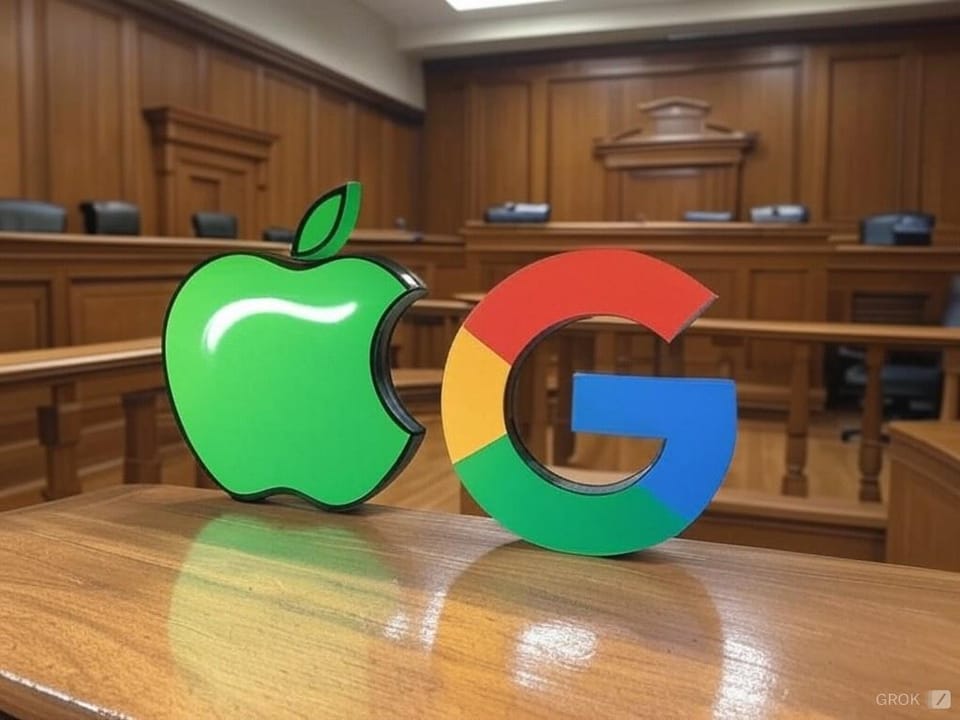Apple Comes to Google's Defense, But the Opposite

Because it was released the day after Christmas and just a few days before New Years – aka The Bermuda Triangle of news dumps – I feel as if not nearly enough was said about the filing Apple made in a recent court case. You may have heard of the case, it's a big one focused on a monopoly. No, not the one about Apple. Another one, around an Apple frenemy: The United States of America v. Google.
Yes, Apple is wading into the Google antitrust case. The one Google already lost, and is now in the remedy recommendation phase. That is exactly why Apple is trying to inject themselves here. Those remedies are very likely to include the altering of the search agreements that Google has traditionally struck with web browser makers to ensure that their search engine is the default. And with Apple specifically, the government views this to be a problem because of the iPhone's position of power. If the government gets their way, those deals are over.
And as has been clear from the get-go, this is just as much of a problem for Apple as it is for Google. And that's why we have no less than Apple SVP Eddy Cue – the person who oversees Services and who has been at Apple since Taylor Swift was born, which he goes out of his way to note in the filing, well, the year anyway: 1989 – making a formal "declaration" in support of Apple's "motion to intervene".
Yes, this is Apple riding in to try to help Google. Sort of. It's really more Apple riding in to help themselves because they believe Google cannot (and really, will not) help them here. After all, if these deals go away, it's not clear much would change other than Google no longer paying Apple "roughly $20 billion" a year – a number which has been widely reported thanks to other court proceedings, but that Cue specifically confirms here.
From Apple's point of view, the government has it wrong in thinking that the end of such an agreement would lead to more competition in the search market because Apple would be more enticed to compete. As Cue pretty directly tells it, Apple is not going to get into search – web search, at least – because it "would cost billions of dollars and take many years".
He is, of course, not wrong here. But the same was true with Google Maps, when Apple decided they wanted to compete there (which, yes, started out poorly, but now is pretty competitive). The real reason Apple is unlikely to go down a web search path is because they believe – as many now do – that web search is yesterday's technology. Today is all about AI. And if Apple were to go down the rabbit hole of web search, it would be "economically risky" – especially because the only way to actually make such a product viable as a business would be through "targeted advertising, which is not a core business of Apple".
Said another way, if this were ten to fifteen years ago, Apple may indeed be compelled to go after web search on their own with such a remedy. But in 2025, it makes basically no sense and it would be an expensive distraction at best from what Apple needs to be working on.
At the same time, Google has the best search engine. Everyone agrees with this, including no less than Microsoft CEO Satya Nadella and others, testifying under oath that Bing, despite also being backed and run by a $3T+ company, can't really compete with Google. So why would we think an Apple offering could? Because it would look nicer?
I mean the real answer there is again, the iPhone. But again, that's the real answer ten or fifteen years ago. I agree that this would just be a huge distraction when Apple should be focused on what's next after web search – specifically, AI. But it's not like Apple can just rip out Google, or any other web search product, from the iPhone. As Cue notes, that would make Apple's product experience worse. And so they won't. Which again leads to the notion that little would likely change if the judge were to accept this remedy in the case – except, again, for those $20B+ yearly payments. Money so large that it even matters to Apple.
It's a sort of weird, "why buy the cow, when you're getting the milk for free?" situation the government would set up here. Only it's more like, "you're not allowed to buy the cow, you simply must enjoy the milk for free."
Hence, Eddy Cue does declare in support of Apple's motion to intervene.
While it remains pretty clear that these default search agreements are over – something that Google has even now stated they're in support of when it comes to remedies (no surprise there given the above, and undoubtedly why Apple filed this declaration now) – as I've said from the get-go, there probably still needs to be some sort of revenue sharing agreement in place. Sure, part of it is what's fair to Apple – though no one will shed any tears over the most valuable company in the world being starved of $20B – but a bigger part is how much such payments matter to the broader ecosystem. Specifically, Firefox. Without such deals – and specifically, payments – it's hard to see how Mozilla can survive.
The Apple element of this is arguably just as interesting as the Google element, because as everyone is well aware by now, a massive percentage of Apple's now-all-important Services business – not to mention overall profit – is their search deal with Google. To the tune of $20B+ a year.
While Su suggest the revenue sharing would stop, I imagine it would just change. No more paying for default placement in lump sums and instead perhaps paying out a share for actual usage. The argument here might be that this would still give Google too much power because they could afford to pay more than anyone else, but an equalized market rate would incentivize product over payment.
And on the topic of Apple (or others) building a new search engine as a result:
Sure, they would be free to do so, but would they? This would seem to really undersell just how hard it is to build a search engine. Maybe AI helps change that equation a bit, but it's not something that's going to change overnight or even in the time horizon we're talking about with these remedies, I suspect. Maybe it entices Apple to finally buy Bing? But would they even be allowed to?! That would seemingly put them in a bad bundling bucket eventually!
And so if we instead assume some sort of "choice screen", it may hurt Apple more than Google because of the end of the default payment. Again, I sill envision some sort of revenue share for search, but it would perhaps be less massive and certainly more lumpy. And yes, Mozilla might be in more trouble than they already are as well in such a world because the revenue would be less constant and predictable, and possibly just less.
It's a weird position for the government to be in. They want these deals to be over, but killing these deals completely will probably only hurt Google's search share marginally, if at all. But it will help Google's bottom line! Money that Google can then plow back into making their search engine better, continuing the cycle.
But really, it's money Google will undoubtedly plow into AI, thus helping to ensure they're a key player – if not the key player – in the aforementioned next technology wave and cycle. This case isn't about that, so the judge technically shouldn't weigh that – unless you think that technology will play a key role in web search going forward. Which... pretty much everyone does at this point?
Anyway, Apple should probably just buy Perplexity?
Update September 2, 2025: And the remedies are now in, and they're largely as expected – including the fact that Google can keep paying Apple for search traffic (just not for default placement)...








